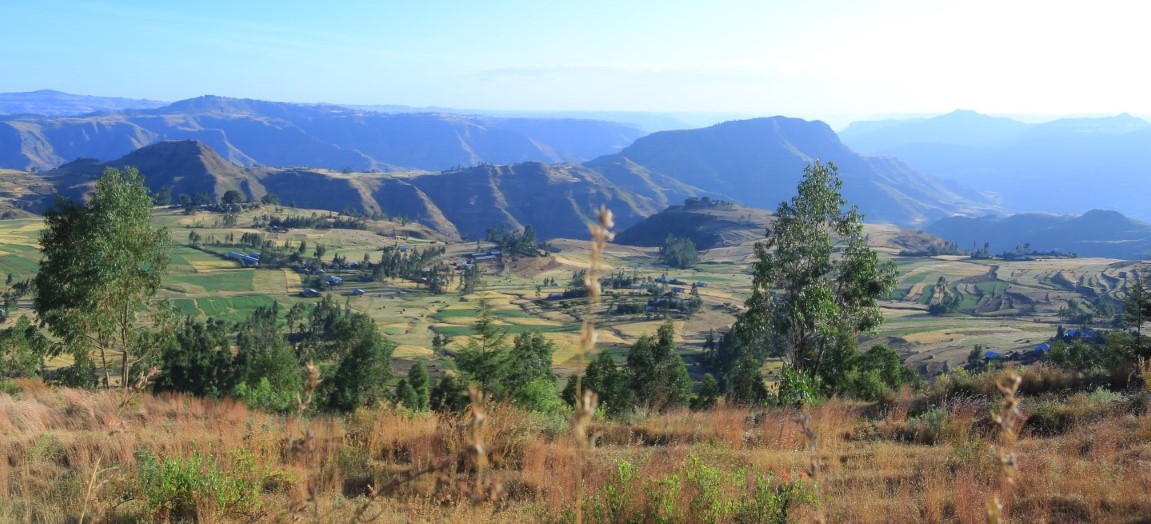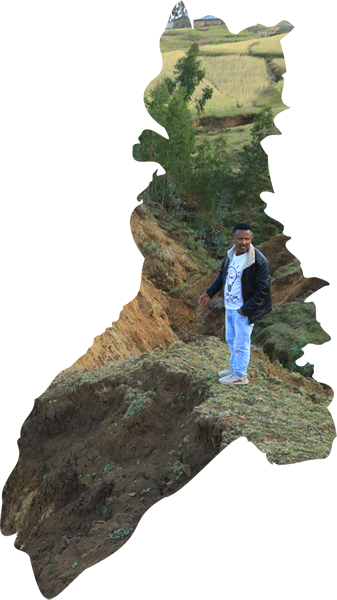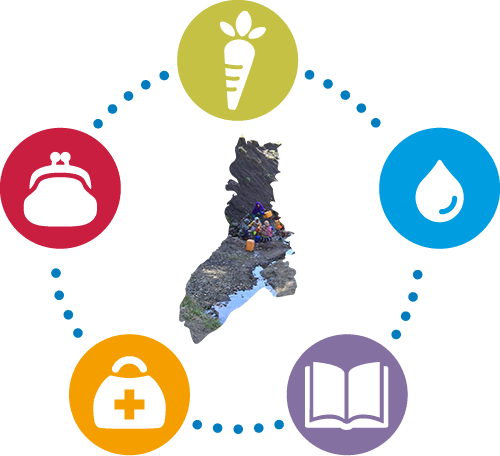
Albuko
Helping people to help themselves - long-term, for 104,000 people.
Since 2023, Albuko has been one of the project regions in which the work is financed entirely by the association Menschen für Menschen Austria. Implementation is carried out in collaboration with our colleagues in Ethiopia, who work hand in hand with the population.
Overview of the project area

2023

23

approx. 500 km²

approx. 104,000 people

Salmene

About 430 km north of the Ethiopian capital Addis Ababa in the South Wollo Zone in the Amhara Region. Mainly middle/highland between 2,300 and 3,030 m

Berhanu Bedassa (as of 2/2023)

Challenges at the beginning of our work in Albuko in 2023
As in many parts of Ethiopia, the people of Albuko face numerous challenges. Most families depend on agricultural yields from their often far too small fields to make a living. In Albuko, the topography alone makes life difficult for the people: Some slopes are too steep to cultivate properly, and so every spot is utilized. In addition, the progressive erosion of the soil is literally taking away the livelihood of the families. The water supply is also one of the biggest daily challenges for the people and especially for the women and girls of the region, who usually collect the water for the family. To do so, they often travel kilometres to draw water from unprotected ponds. Only just under half of the people in Albuko have access to clean drinking water at all.

48 % of the people do not have access to clean drinking water

75 % of the people do not have access to safely managed sanitation


What we are doing in Albuko
Together with the population, the Ethiopian employees of Menschen für Menschen implement various measures in our focal areas of agriculture, water, education, health, and human development. The goal is to initiate long-term development in the entire region so that the people become independent of external support. For this purpose, the different measures are planned according to the needs in the region and also implemented hand in hand with the population.
Project planning 2023
Beyond the initiatives indicated here, further activities are being implemented in the fields of agriculture, water, education, health, and human development to create a good basis for the sustainable development of the Albuko region. Planning through the end of 2023 includes:

2 Spring catchments built
Wells and spring catchments are built near the villages. Clean, healthy drinking water sustainably improves people's health and saves them a lot of time collecting water.

01 Solar fridge for medicines and vaccines
By equipping health stations with solar fridges, the cold chain is maintained and the primary care providers in the villages can offer better medical care to the families.

4,100 children receiving life-saving vaccinations
Easily preventable illnesses are still common in Ethiopia, due to lack of vaccination. We support vaccination campaigns to protect children.

50 Women participate in the microcredit program
Microcredits often give women their first opportunity to earn an income on their own. The credit groups operate independently, and the entire region benefits from economic development in the long term.

200 Households receiving fuel-efficient stoves
Fuel-efficient stoves reduce the need for fuel by about half. Not only does this protect the tree population and the environment, but women also save a lot of time because they have to collect less wood or brushwood.

20 Families receive modern bee hives
Beekeeping opens a good source of income for the families, for which they do not need additional land. Training and modern equipment increase the yield and quality of honey.

01 Youth cooperation on animal rearing established
Young adults are supported in the establishment of cooperatives, for example for the production of wood-saving stoves, with training and the necessary initial equipment.

600 Chickens or roosters given to families
Livestock represents important security for families in difficult times. A flock of chickens provides them with an income and better nutrition.
